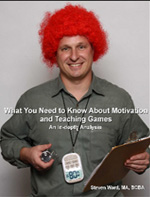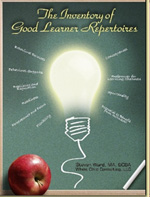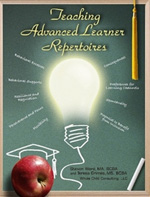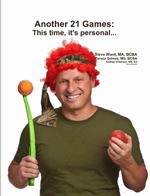“At Whole Child Consulting, we’ve been receiving many requests for webinars (live and recorded) and we will be providing these over the next several months. CE’s will be available. We will be offering the following webinars: Calming; Teaching Executive Function; Reinforcer-seeking Games; Expanding Interests. What are some additional topics that would interest you?”

WHOLE CHILD CONSULTING, LLC
Whole Child Consulting is not only for children, but for adults as well. We provide unique solutions targeting your individual needs. Take a look around and discover what Whole Child Consulting can do for you! We Believe:
- A “deep understanding” is developed by taking time to understand the relationship between a learners abilities and interests and the environments in which they live. Assessment should be ongoing and personalized.
- It is preferable to create multi-dimensional programs that address objectives across a variety of learning channels while accounting for motivation.
- The teachers (e.g. school personnel, therapists, family members) best serve their learners needs by understanding how and why interventions work. This helps teachers maintain broad perspective and develop into problem-solvers.
- Instruction should foster intrinsic motivation and develop foundational repertoires that facilitate the acquisition of future objectives.
- Procedures used to address one behavior are likely to affect other repertoires. We are rarely actually treating a single behavior, but are always treating the “whole child”.
Whole Child Consulting – Upcoming Workshops
March 2024 Monthly Webinar – Play: Creative Ideas and Detailed Processes for Pursuing Intrinsic Motivation
with Steve Ward, April Dyal, Madelyn Vickery – Play! by Steve Ward: March 19, 2024 at 12pm Eastern Time (US and Canada)
The Do Better Collective Monthly Webinar Series is FREE to the public for live viewing or 1 month access to the recording.
To receive CEs or view the recording, join as a Trailblazer member or you can purchase the course!
*First time subscribers receive 20% off membership with code: firsttime20
Webinar Description:
I’m thrilled to extend a personal invitation to you for an exclusive webinar that promises to revolutionize your understanding of play in education. How many different things can you do with a paper towel roll? What about straws? The value of play is widely recognized in child development, with impacts upon the student-teacher relationship, communication, flexibility, and much more. But it can be difficult to keep things fresh. Some learners are difficult to engage. In these cases, subtleties in the PROCESSES of engagement are critical. Many RBT’s, parents, teachers, etc are accustomed to being told what to teach and how to teach, and some struggle to generate creative play ideas.
In this presentation, we will discuss aspects of healthy play processes and will share a LOT of creative play ideas with common materials. Everyone will leave with new play ideas!
This isn’t just another webinar. It’s a collaborative effort with industry leaders to explore the transformative power of play in fostering creativity and learning.
We’re here to share strategies, techniques, and real-life applications that will empower you to bring innovation into every lesson.
Why should you attend? Because this is your chance to earn 2 CE credits while discovering methods that will make a tangible difference in your professional life. Plus, it’s absolutely FREE to join!
About the Presenter:
Steve Ward, MA, BCBA has been working in the field of Behavior Analysis since 1995, and is currently co-owner of Whole Child Consulting, LLC. Steve has been consulting to teams around the world, addressing everything from early communication and physical aggression to vocational opportunities and inclusion in college courses.
Whole Child Consulting – Links to Recorded Webinars
Translating IGLR Scores into Programming Part 1
In this webinar, we will review examples from several learners and participants will have opportunities to generate plans for their learners.
About this event – Webinar Recording will be available via your Eventbrite ticket following the event. By C.A.B.S autism and behavior specialists.
Translating IGLR Scores into Programming (Part 1) —-
The Inventory of Good Learner Repertoires (Ward & Grimes, 2008) can be used to assess how to best teach a learner. Does he enjoy social interactions? Does he approach others for access to preferred items? Will he prefer errorless teaching or is he averse to prompting? Does he work well independently and, if not, what do we need to strengthen to support independence?
Towards this end, scorers are also asked to identify potential sore spots for learners, such as the extent to which they tolerate changes in routines, delays, and corrections.
Necessarily, the translation of these findings into programming is largely an art. Experienced teachers may determine that their learners are already doing very well with existing teaching procedures, that they would benefit from more/less ambitious curricula, that certain learner repertoires should be “put under the microscope”, and more.
Participants will be able to:
• List at least 5 repertoires that, if strong, improve the efficiency with which a student learns.
Date Recorded: Mon, Dec 19, 2022, 3:00 PM
Healthy Manding
Learn to develop spontaneity in your learners mand repertoire, avoid prompt dependency and teach your learners to tolerate delays.
About this event – Live Event October 4th 4:00-6:00pm CST. Webinar Recording will be available via your Eventbrite ticket following the event.
Healthy Manding —-
Skinner (1957) identified the mand as a primary verbal operant, critical to the development of verbal and social repertoires. The importance of the mand (request) has been popularized over the past 25 years, especially by Sundberg and Partington (1998), and many learners have made tremendous gains. Students have communicated wants and needs to family and teachers, engaged in fewer problem behaviors, developed functional vocabulary, learned to appreciate the value of others, learned to make eye contact, and become increasingly cooperative. Mand repertoires have served as a foundation that has ultimately led to fluent conversational repertoires.
But many learners have: failed to develop spontaneity, resisted prompts to mand, become dependent upon prompts to mand, “scrolled” (i.e., rapidly emitted a variety of inaccurate mands before landing on the correct mand), turned into “manding machines” (i.e., students who mand at an excessive rate, fail to tolerate delays, or fail to tolerate “no”)
For some students, functional mand repertoires, and their many potential collateral benefits, cannot be realized without the use of refined teaching procedures. Those procedures will be detailed in this workshop.
Participants will be able to:
• List at least 3 potential benefits of the development of a healthy mand repertoire
• List at least 2 potential hazards associated with the development of a mand repertoire
• Describe how the timing of prompts impacts a learner’s responsiveness to, or dependence upon, those prompts
• Individually tailor differential reinforcement policies to the needs of a particular student
• Establish stable and flexible tolerance of delays in reinforcement from their learners
• Gather data on the development of healthy mand repertoires
2 BCBA CEUs available
Date Recorded: Oct 4th, 4:00-6:00 CST
Scoring The Inventory of Good Learner Repertoires – PART 1
About this event – As more parents and professionals are using The Inventory of Good Learner Repertoires (Ward & Grimes, 2008), there is also increased interest in and questions about how to accurately score this assessment. While a FREE 92-page book is available detailing how to score the Inventory, we know that many people prefer to listen, watch, practice and discuss. So, we are providing a 2-part webinar on scoring. The first 2-hour webinar is an introduction to scoring the Inventory.
In this webinar, we will: put scoring into perspective, discuss how gauging “steam” is critical to scoring the Inventory-review videos of student performance and practice scoring items-cover all of the basic “nuts and bolts” of scoring, such as how to tally scores and graph percentages, score Behavioral Excesses, Behavioral Supports, Perseverance and Focus, and Spontaneity
Participants will be able to:
1. Navigate basic steps of condensing item scores into summary scores of domains
2. Score many of the easiest items on The Inventory of Good Learner Repertoires
Note: You are signing up for part 1 of a 2 part training on scoring the Inventory of Good Learner Repertoires. Use the discount code provided with your registration for a discount on part 2.
The second 2-hour webinar will be more advanced and will “get into the weeds” on details specific to learners with whom you work. We will:-discuss age-appropriate developmental levels-score “Preferences for Learning Channels” (consistently the most difficult domain to score)-have an extended “Question and Answer” period-score many of the items from Resilience and Regulation, Readiness, Flexibility, and Consequences -for those participants with sufficient interest and planning skills, we will gather proof of parental consent prior to the day of the webinar and view relevant videos to assist in scoring
Participants will be able to:1. Accurately score The Inventory of Good Learner Repertoires for a learner they know.
2. Discuss the relevance of learner scores for specific items.
Which webinar(s) should you attend? While everyone is welcome to attend each of these webinars and while a small discount is available for purchasing them as a package, we know that many of you are comfortable with the basics. Therefore, access to the advanced webinar is not contingent upon completion of the first webinar. That said, we will not slow down during the advanced webinar to cover basics. So, if you join only the advanced webinar and have basic questions, you will have only yourself to blame.
Date Recorded: May 24th, 12:00EST
Teaching Calming to Kids with ASD – Webinar
About this event – Anxiety is a common problem, especially among learners diagnosed with Autism Spectrum Disorder. While there is a wide variety of treatment options, none of these options should be seen as “one size fits all” and any treatment plan needs to consider the “whole child”. This webinar will cover multicomponent programming for learners with issues related to anxiety, with a particular focus on a procedure colloquially known as “calm counts”.
Participants will be able to:
1. Distinguish when “calm counts” may be an appropriate intervention.
2. List “do’s” and “don’ts” regarding the implementation of “calm counts”.
Date Recorded: January 27th, 12:00EST
Teaching Scanning Skills to Kids with ASD – Webinar
About this event In this one hour webinar, we will review: a variety of exercises and games that can earn functional scanning repertoires. A lot of skills, from locating a friend in the mall to matching identical objects, require scanning. Attempts to teach these skills without an emerging scanning repertoire can be fruitless and can contribute to learners becoming more difficult to teach over time. Teachers have long struggled to earn consistent scanning from their learners. Some teachers have run out of ideas and have attempted to physically prompt learners to scan. Most of us can see the flaws in that approach. Using a bottom-up approach, some teachers have explicitly prompted and reinforced scanning, in isolation of other skills. While this is a fair and logical approach, I will make the case in this webinar that more effective, more meaningful interventions exist. In this webinar, we will review: a variety of exercises and games that can earn functional scanning repertoires; provide examples of bottom-up instructional sequences; describe (in)effective instructional processes.*Note, “Scanning” pairs with “Reinforcer-seeking Games”, which will only be reviewed very briefly during the “Scanning” webinar. Date Recorded: December 9, 2021, 5:30PM EST
Reinforcer-Seeking Games – Webinar
About this event Establishment of social stimuli as reinforcers is perhaps the highest priority in programs for learners diagnosed with ASD. Ideally, we’re able to establish this value during natural, free-flow interactions, such as by joining a learner who is playing with trains and making this play better with us than it is without us. This can be easier said than done as some learners have very limited interests and some can be defensive of play materials. It can also be difficult to train teachers and parents to flexibly join learners in play. In these cases, we may begin by teaching a variety of ways of accessing currently effective reinforcers (e.g., trains, treats, markers, letters, etc). We can begin with easy examples of hiding reinforcers, such as “hide-the-prize” and we can build towards more advanced examples, such as “Scavenger Hunt” and “Hotter/colder”. Each of these activities brings multiple potential benefits to the teacher-student relationship and it is relatively easy to train teachers and parents in their implementation. Date Recorded: December 6, 2021, 5:00PM CST
Building Rapport and Expanding Interests in Learners with ASD
About this event This workshop will provided strategies to improve rapport with your learner while expanding upon their interests within play. Steve Ward, MA, BCBA, author of 5 books on play and learner repertoires, presented a workshop geared toward the expansion of learner interests, with particular focus on social interest. As always, his primary focus was on the meaningful development of foundational learner repertoires, such as the establishment of social attention as a form of reinforcement. This workshop provided practical play strategies in a cohesive and conceptually systematic manner. Guidelines for free-flow and intrinsically motivated play was provided, as were suggestions for the use of extrinsic motivation. Date Recorded Tue, Aug 24, 2021, 12:00 PM EDT
Advanced Executive Function Webinar
About this event This webinar follows “An Introduction to Executive Function” and is “advanced” from the perspectives of analyses and of teacher behavior. For example, we will “drill down” from potential targets to the foundations and prerequisites that support them. We will also consider targets through the lens of “Dimensions Grids”. Date Recorded Oct 15, 2021, 12:00 PM EDT
Introduction to Executive Function Repertoires
About this event “Executive function” is a construct used to describe repertoires critical to many aspects of life. It is sometimes described as “the management system of the brain”. Executive function is divided into 3 broad domains: working memory, cognitive flexibility, and inhibitory control. When a student apparently lacks one of these repertoires, it is common to introduce a support, such as visual reminders. While potentially part of the solution, these supports are not magic! In this introductory presentation, we will focus primarily on practical strategies for teaching executive function skills. While these skills usually continue to develop during adolescence, the foundations of these skills can be taught much sooner. Date Recorded Sep 14, 2021, 11:00 PM CST
Whole Child Consulting – Links to Podcasts
Thoughts & Rants of a Behavior Scientist – Assent and Compliance – When to Use Which with Steve Ward/Dr. Paul “Paulie” Gavoni
JAN 22, 2023 W/ Steve Ward/Dr. Paul “Paulie” Gavoni – The concept of assent has garnered a lot of attention in recent years. And rightfully so. Engaging learners in their treatment is extremely important. Like you, they don’t want things done “to” them but done “with” them. Behavior Analysts recognize they have assent when a learner verbally or non-verbally agrees to participate in treatment.
But is assent ALWAYS needed? Are there conditions where compliance is necessary? In this episode, veteran behavior analyst, Steve Ward, takes a deep and sometimes humorous dive into the concepts of assent and compliance.
All content © 2023 Thoughts & Rants of a Behavior Scientist.
The Behavioral Observations Podcast – How to Help Individuals with Anxiety: Session 187 with Steve Ward
MAY 5, 2022 W/ Steve Ward – In Session 187, Steve Ward joins me to discuss how to help individuals – in particular, individuals with severely limited communicated repertoires – who demonstrate challenging repertoires that are colloquially referred to as Anxiety.
Given that tortured sentence, you can probably already imagine that in this episode, we discuss how Steve conceptualizes what exactly Anxiety is, especially in populations who cannot verbally report on their private verbal behavior. More importantly, we discuss how he developed what he calls the “calm counts” procedure, and review a case study of this intervention that he recently published.
All content © 2022 The Behavioral Observations Podcast. Date Recorded May 5, 2022
The Behavioral Karma Podcast – The Power of Fun When Learning with Steve Ward
SEPTEMBER 21, 2021 BILLY BROWN & DR. PAUL “PAULIE” GAVONI SEASON 1 EPISODE 62 On this episode we have a lot of fun with veteran Behavior Analyst and author, Steve Ward, about the importance of making learning fun. Steve shares some stories and tips on how to make learning fun. Check out the Behavioral Karma YouTube Channel for tips on using the practical application of the science of human behavior for making a positive difference personally and professionally. All content © 2021 The Behavioral Karma Podcast. Date Recorded Tue, Aug 24, 2021, 12:00 PM EDT
Whole Child Consulting – Meet Our Teachers
Together, Steve and Terry form “Whole Child Consulting”, so named because they believe that no single behavior can be isolated from the rest of a person’s repertoires. In other words, they believe in treating the “whole child”. Steve and Terry currently travel the world to provide workshops, and consult to schools and families in all relevant settings. They provide distance consultation via webcam, phone, and email in between on-site visits in order to maintain close contact with each learner’s progress.
Purchase Our Books…
JUST RELEASED!!! – ANOTHER 21 GAMES: THIS TIME, IT’S PERSONAL…
Another 21 Games: This time, it’s personal…is a sequel to the popular “What You Need to Know about Motivation and Teaching Games: An in-depth analysis” (Ward, 2008). Another 21 Games provides great detail regarding the development of competition, sportsmanship, and tolerance of losing. Deficits in these areas too frequently undermine motivation to participate in games. And flexible instructional frameworks are provided for 21 games, 4 of which have been newly developed for the current book. These cover the areas of physical movement, scanning, compliance, cooperation, travel, language, and (educated) guessing. Pick a game to meet your needs or, better yet, read the whole book and learn how to analyze play!

WHAT YOU NEED TO KNOW ABOUT MOTIVATION AND TEACHING GAMES
What You Need to Know about Motivation and Teaching Games: An in-depth analysis” is essential for anyone working with learners with social delays, including learners with Autism…

INVENTORY OF GOOD LEARNER REPERTOIRES
A “good learner” is someone who readily responds to instruction in a wide variety of situations. “The Inventory of Good Learner Repertoires” covers 139 items that assess the ease with which a learner can be taught…

TEACHING GOOD LEARNER REPERTOIRES
Teaching Good Learner Repertoires is a “how to” book that will guide you to make your student easy to teach. Steve Ward, MA, BCBA and Terry Grimes, MS, BCBA bring decades of experience to this follow-up to the Inventory of Good Learner Repertoires.

TEACHING ADVANCED LEARNER REPERTOIRES
An “advanced learner” is someone who is usually cooperative across a variety of contexts, usually tolerates brief delays, denials, and corrections, and is at least beginning to develop independent task completion, and is now ready for the next step.






